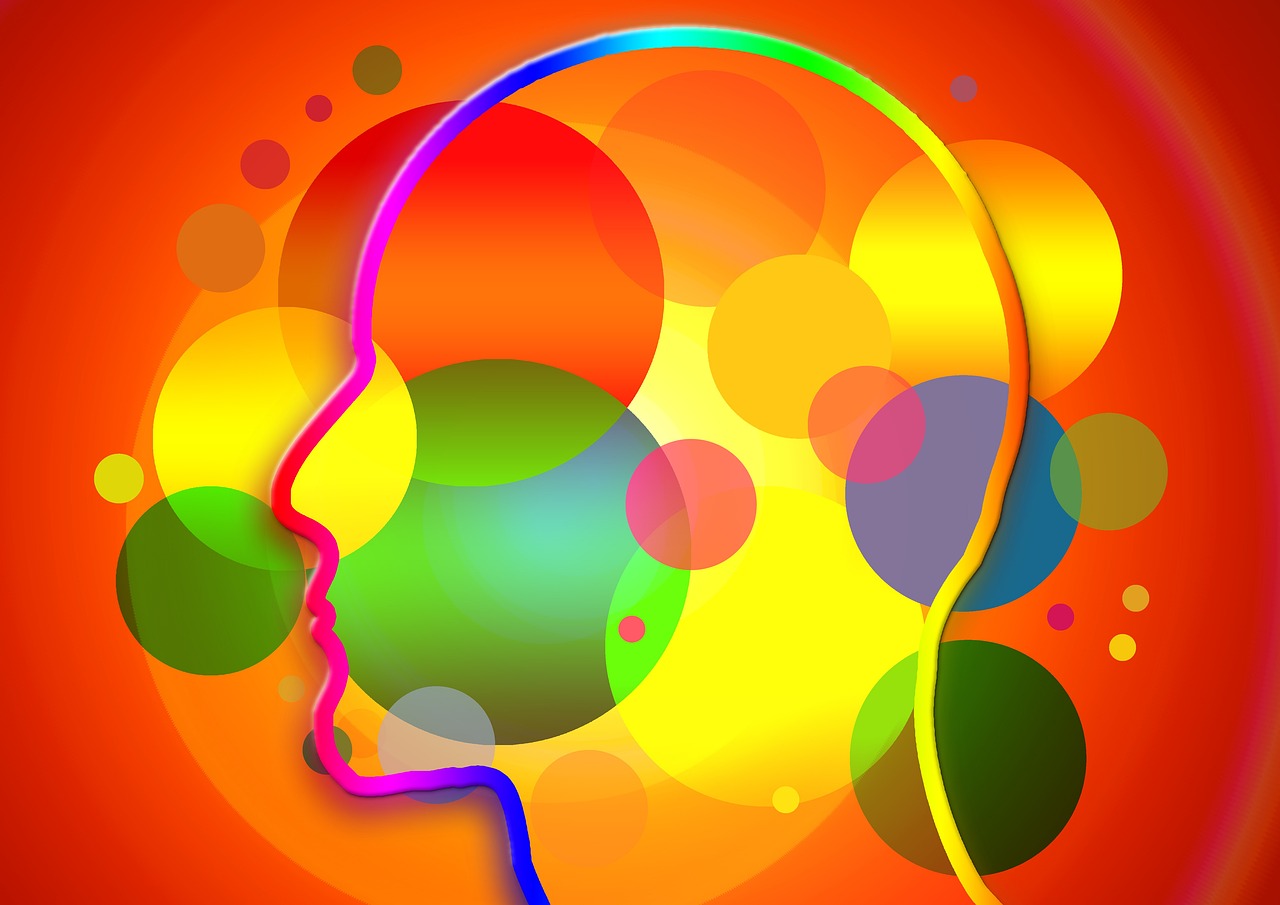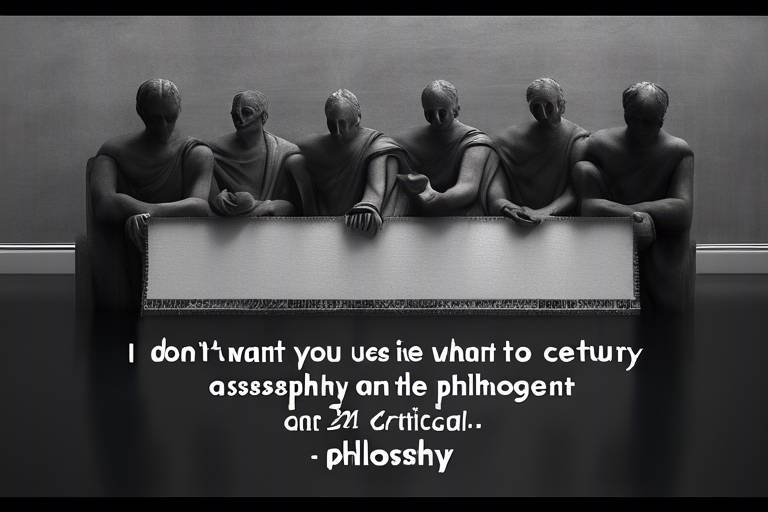The Philosophy of Happiness - An Intriguing Study
Happiness is a concept that has captivated the minds of thinkers, poets, and everyday individuals for centuries. But what does it truly mean to be happy? Is it merely the absence of pain, or is it something more profound? In this exploration, we will peel back the layers of happiness, examining it through various philosophical lenses. We will delve into historical perspectives, modern interpretations, and practical applications that can help us navigate our own pursuit of happiness in today's fast-paced world.
Understanding what happiness means is the first step in exploring its philosophical implications. Happiness is often defined in two primary ways: subjective and objective. The subjective view posits that happiness is a personal experience, unique to each individual. It can encompass feelings of joy, contentment, and fulfillment. On the other hand, the objective perspective suggests that happiness can be measured by certain criteria, such as health, wealth, and social status. These definitions raise essential questions: Can happiness be quantified? Or is it a deeply personal journey that defies strict categorization?
The pursuit of happiness has been a central theme in philosophy throughout history. Thinkers like Aristotle and Nietzsche have shaped our understanding of what it means to live a happy life. By examining their philosophies, we can glean insights into how happiness has evolved over time and how these ideas remain relevant today. For instance, Aristotle’s concept of eudaimonia emphasizes a life of virtue and rational activity, suggesting that true happiness is not just about fleeting pleasures but about achieving a state of flourishing.
Aristotle’s philosophy revolves around the idea of eudaimonia, often translated as "flourishing." This concept goes beyond mere happiness; it encompasses living a life of virtue and fulfilling one's potential. Aristotle believed that happiness is the ultimate goal of human existence, and it can only be achieved through the practice of virtue. This raises an intriguing question: can we find happiness without striving for moral excellence? Aristotle would argue that the two are inseparable, as true contentment comes from living in accordance with our highest selves.
In Aristotle's view, the relationship between virtue and happiness is fundamental. He posited that moral character is essential for achieving true contentment in life. Virtues, such as courage, temperance, and wisdom, are not just arbitrary traits; they are the building blocks of a happy life. By cultivating these virtues, we can navigate life's challenges with grace and resilience, ultimately leading to a more fulfilling existence. This perspective invites us to reflect: how often do we consider the role of our character in our own happiness?
Aristotle also introduced the notion of phronesis, or practical wisdom, as a crucial component of achieving happiness. This concept emphasizes the importance of making sound decisions based on experience and ethical considerations. Practical wisdom allows us to discern what truly contributes to our well-being, guiding us in our choices and actions. In a world filled with distractions and superficial pursuits, cultivating practical wisdom can lead to a more meaningful and satisfying life.
Contemporary philosophers offer diverse perspectives on happiness, often challenging traditional views. For instance, some argue that happiness is not a destination but a journey, shaped by our experiences and relationships. Others contend that happiness is closely tied to our ability to adapt to life’s changes. These modern theories remind us that happiness is not a one-size-fits-all concept; it is fluid and can vary greatly from person to person. This evolving understanding encourages us to embrace our unique paths in the pursuit of happiness.
In recent years, the practice of mindfulness has gained traction as a powerful tool for enhancing happiness. Mindfulness encourages us to be present in the moment, fostering a deeper connection with our thoughts and feelings. By cultivating this awareness, we can significantly impact our overall sense of well-being. Have you ever noticed how being fully present can transform mundane moments into extraordinary experiences? Mindfulness teaches us to appreciate the beauty in everyday life, leading to a more profound sense of contentment.
Various techniques, such as meditation and breathing exercises, can cultivate mindfulness. These practices help quiet the mind, allowing us to focus on the here and now. Integrating mindfulness into our daily routines can be as simple as taking a few moments to breathe deeply or savoring the taste of our meals. By doing so, we can enhance our happiness and improve our overall quality of life.
Research supports the benefits of mindfulness in promoting happiness. Studies have shown that mindfulness practices can lead to reduced stress, improved mental health, and greater life satisfaction. For example, a meta-analysis of multiple studies found that individuals who practice mindfulness regularly report higher levels of happiness and lower levels of anxiety. This scientific backing reinforces the idea that being present can significantly enhance our well-being.
Interpersonal connections play a significant role in our happiness. The relationships we cultivate with family, friends, and colleagues can greatly influence our sense of well-being. But what makes these connections so vital? It's the emotional support, shared experiences, and sense of belonging that enrich our lives. Have you ever felt a surge of joy simply from spending time with loved ones? Those moments remind us that happiness is often found in the company of others.
The quality of our relationships often outweighs the number of connections we have. Deep, meaningful relationships can enhance our happiness far more than superficial interactions. It's not about how many friends we have on social media; it's about the depth of our connections. Engaging in genuine conversations, sharing vulnerabilities, and supporting one another can create bonds that profoundly impact our happiness.
A sense of belonging is crucial for happiness. Being part of a community provides us with social support and a shared identity. Whether it's through clubs, organizations, or local gatherings, these connections foster a sense of belonging that can significantly enhance our overall well-being. When we feel connected to others, we are more likely to experience joy and fulfillment in our lives.
- What is the difference between happiness and pleasure? Happiness is a deeper, more lasting state of well-being, while pleasure is often fleeting and tied to specific experiences.
- Can happiness be pursued? Yes, happiness can be pursued through various means, including cultivating relationships, practicing mindfulness, and living a life of virtue.
- How can I incorporate mindfulness into my daily life? Start with small practices, like mindful breathing or paying attention to your surroundings, and gradually build a routine that works for you.
- Is happiness the same for everyone? No, happiness is subjective and can vary greatly from person to person based on individual values, experiences, and circumstances.

Defining Happiness
Understanding what happiness means is the first step in exploring its philosophical implications. Happiness, a term that often dances on the tongues of philosophers, psychologists, and everyday people alike, can be as elusive as a shadow. What exactly does it mean to be happy? Is it a fleeting emotion, a state of being, or perhaps something deeper? To tackle this question, we need to explore various definitions of happiness, highlighting the distinctions between subjective and objective interpretations.
Subjective happiness refers to an individual's personal experience and perception of their well-being. It's the warm, fuzzy feeling you get when you see a loved one or the thrill of achieving a long-sought goal. On the other hand, objective happiness can be seen as the measurable aspects of well-being—think of it as the happiness that can be quantified through surveys or life satisfaction scales. These two interpretations often overlap, but they also open up a rich dialogue in philosophical discourse.
In the quest to define happiness, we can draw from a variety of sources. Some people find happiness in material possessions, believing that wealth can buy joy, while others argue that true happiness stems from experiences and relationships rather than things. For instance, a study might show that people who prioritize experiences over material goods report higher levels of satisfaction. This leads us to ponder: is happiness truly a state of mind, or is it influenced by external factors?
To further illustrate these concepts, consider the following table that outlines different perspectives on happiness:
| Perspective | Description |
|---|---|
| Hedonism | Happiness is the pursuit of pleasure and avoidance of pain. |
| Eudaimonia | Happiness is achieved through virtue and living a meaningful life. |
| Utilitarianism | Happiness is the greatest good for the greatest number. |
As we delve deeper into these definitions, we can't help but ask ourselves: what truly makes us happy? Is it the thrill of a new adventure, the comfort of a warm home, or the laughter shared with friends? The answers may vary from person to person, but one thing is clear—happiness is a fundamental part of the human experience, shaping our choices, our relationships, and ultimately, our lives.
In conclusion, defining happiness is not a one-size-fits-all endeavor. It requires an exploration of both subjective experiences and objective measures, an acknowledgment of the complex interplay between our emotions and the world around us. As we continue our philosophical journey, let’s keep these definitions in mind, for they will serve as a compass guiding us through the intricate landscape of happiness.

Historical Perspectives
The pursuit of happiness is not a modern obsession; it has been a central theme in philosophy throughout history. From ancient philosophers to contemporary thinkers, the quest for happiness has shaped human thought and behavior. This section dives deep into the ideas of key figures like Aristotle, Epicurus, and Nietzsche, each contributing unique perspectives that have influenced our understanding of happiness.
Aristotle, often regarded as one of the greatest philosophers of all time, introduced the concept of eudaimonia, which is often translated as 'flourishing' or 'well-being.' He argued that happiness is not merely a fleeting emotion but a state of being achieved through a life of virtue and rational activity. Aristotle believed that true happiness is found in the pursuit of excellence, and that living a virtuous life is essential to achieving this state. His ideas laid the groundwork for ethical philosophy and continue to resonate in discussions about happiness today.
Moving forward in time, we encounter the philosophy of Epicurus, who emphasized the importance of pleasure and the avoidance of pain as the cornerstones of a happy life. However, Epicurus was not advocating for indulgence in every whim; rather, he suggested that true pleasure comes from simple, moderate living and the cultivation of friendships. His philosophy encourages us to seek happiness through self-reflection and the appreciation of life's small joys, a notion that echoes in modern mindfulness practices.
Fast forward to the 19th century, and we find the provocative thoughts of Friedrich Nietzsche. Nietzsche challenged traditional notions of happiness, suggesting that it is not a goal to be pursued but a byproduct of living authentically and embracing life's struggles. He famously declared that "what does not kill me makes me stronger," indicating that overcoming adversity is integral to personal growth and, ultimately, happiness. Nietzsche's perspective invites us to reconsider our understanding of happiness as something more profound than mere pleasure or comfort.
Throughout history, the philosophical discourse surrounding happiness has evolved, yet certain themes remain constant. To summarize these historical perspectives, we can look at the following key points:
| Philosopher | Key Concept | Impact on Happiness |
|---|---|---|
| Aristotle | Eudaimonia (Flourishing) | Happiness through virtue and rational activity |
| Epicurus | Pleasure and Pain | Happiness through simple living and friendship |
| Nietzsche | Authenticity and Struggle | Happiness as a byproduct of overcoming challenges |
These historical perspectives not only enrich our understanding of happiness but also serve as a reminder that the quest for happiness is a timeless endeavor. Each philosopher offers insights that can be applied to our modern lives, encouraging us to reflect on our values and the ways we seek fulfillment. As we continue to explore the dimensions of happiness, it is essential to recognize the contributions of these thinkers and how their ideas continue to shape our understanding of what it means to live a happy life.
- What is the main difference between Aristotle's and Epicurus' views on happiness?
Aristotle believed happiness is achieved through virtue and rational activity, while Epicurus emphasized pleasure and the avoidance of pain as central to happiness.
- How does Nietzsche's philosophy challenge traditional views of happiness?
Nietzsche suggests that happiness is not a goal but a byproduct of living authentically and embracing life's challenges.
- Can historical philosophical perspectives on happiness be applied to modern life?
Absolutely! The insights from these philosophers encourage us to reflect on our values and the ways we seek fulfillment in our lives today.

Aristotelian Ethics
When we dive into the realm of Aristotelian ethics, we encounter a rich tapestry of thought that emphasizes the profound connection between virtue and happiness. Aristotle, the ancient Greek philosopher, proposed that true happiness, or eudaimonia, is not merely a fleeting emotion but a state of being that arises from living a life of virtue. Imagine happiness as a garden; it flourishes when nurtured by the right practices and moral character. Aristotle believed that to achieve this flourishing, one must engage in rational activities and cultivate virtues that align with their true nature.
At the heart of Aristotelian ethics lies the idea that happiness is an end goal, something we all strive for, yet it is attainable only through the practice of virtue. Aristotle identified several key virtues, which can be categorized broadly into moral and intellectual virtues. Moral virtues, such as courage and temperance, guide our actions and emotions, while intellectual virtues, including wisdom and understanding, shape our reasoning and decision-making processes. This duality is crucial; without the balance of both, achieving true happiness becomes a daunting challenge.
Aristotle’s view also emphasizes the importance of community and relationships in the pursuit of happiness. He argued that humans are inherently social beings, and our interactions with others significantly influence our well-being. Just as a tree needs a supportive ecosystem to thrive, we, too, require meaningful connections to cultivate our happiness. In this context, Aristotle's ethics suggest that the quality of our relationships is paramount; deeper, more meaningful interactions yield a richer sense of fulfillment than mere acquaintances.
Furthermore, Aristotle introduced the concept of practical wisdom, or phronesis, which plays a pivotal role in ethical decision-making. Practical wisdom is not just about knowing what is right; it’s about applying that knowledge in real-life situations. It’s akin to having a compass that guides you through the complexities of life. By honing our practical wisdom, we can navigate challenges more effectively, making choices that align with our values and ultimately lead us toward happiness.
In conclusion, Aristotelian ethics offers a compelling framework for understanding happiness as a multifaceted pursuit. It’s not just about personal gratification; it’s about cultivating virtues, fostering relationships, and exercising practical wisdom. By integrating these elements into our lives, we can aspire to achieve a deeper, more sustainable form of happiness that resonates with our true selves.

Virtue and Happiness
When we dive into the philosophical waters of happiness, we often stumble upon the idea of virtue. Aristotle, a towering figure in ancient philosophy, argued that true happiness, or eudaimonia, is deeply intertwined with the cultivation of virtue. But what does that mean for us in our daily lives? Essentially, Aristotle believed that to achieve genuine happiness, one must not only pursue pleasure but also develop a robust moral character. This means that our actions, thoughts, and intentions must align with virtues such as courage, temperance, and justice.
Think of virtue as the compass guiding us through life's tumultuous seas. Without it, we might find ourselves adrift, chasing fleeting pleasures that ultimately lead to dissatisfaction. Virtue provides a foundation for happiness by encouraging us to act in ways that are beneficial not just to ourselves but also to others. This brings us to an essential point: happiness is not a solitary endeavor. It flourishes in a garden where virtues are nurtured, allowing us to cultivate deeper connections with those around us.
Moreover, Aristotle emphasized that happiness is not merely about achieving a state of mind but involves engaging in activities that reflect our highest values. When we act virtuously, we experience a profound sense of fulfillment. For instance, consider the joy that comes from acts of kindness or the satisfaction derived from pursuing knowledge. These moments are not just pleasant; they are integral to our overall well-being.
To illustrate this connection further, let’s explore some key virtues and how they relate to happiness:
| Virtue | Relation to Happiness |
|---|---|
| Courage | Enables us to face challenges and overcome fears, leading to personal growth. |
| Temperance | Helps us find balance and moderation, preventing overindulgence and regret. |
| Justice | Fosters a sense of fairness and community, enhancing our connections with others. |
| Wisdom | Guides our decisions, allowing us to navigate life's complexities with clarity. |
In essence, the practice of virtue is a lifelong journey. It requires self-reflection, commitment, and a willingness to grow. Engaging in virtuous activities not only enhances our own happiness but also positively impacts those around us. So, the next time you find yourself pondering the meaning of happiness, consider asking yourself: Am I living in accordance with my values? This question can serve as a powerful motivator to align your actions with the virtues that resonate most with you.
By fostering a virtuous life, we unlock the door to a deeper, more fulfilling happiness—one that is sustainable and enriching. Virtue and happiness are not just abstract concepts; they are the tools we can wield to create a life filled with meaning and joy.
- What is the relationship between virtue and happiness?
Virtue is essential for achieving true happiness as it guides our actions and fosters deeper connections. - Can happiness exist without virtue?
While one may experience fleeting happiness without virtue, lasting happiness is rooted in virtuous living. - How can I cultivate virtue in my life?
Practicing self-reflection, engaging in community service, and making decisions aligned with your values can help cultivate virtue.

Practical Wisdom
When we talk about happiness, it’s easy to get lost in the whirlwind of emotions and fleeting pleasures. However, the ancient Greek philosopher Aristotle introduced a concept that can anchor us in the pursuit of true joy: , or phronesis. This isn’t just about knowing what to do; it’s about understanding how to act in the complexities of life. Imagine being a ship captain navigating through stormy seas. Knowing the destination is one thing, but having the wisdom to adjust your sails, read the winds, and react to the waves is what truly matters.
Practical wisdom involves a deep understanding of both ourselves and the world around us. It’s about making choices that reflect our values while considering the consequences of our actions. For instance, let’s say you’re faced with a decision at work: do you take a shortcut that could lead to quick success but might compromise your integrity? Or do you invest the time and effort to do it right, even if it means slower progress? Practical wisdom nudges you toward the latter, emphasizing the importance of moral character in achieving lasting happiness.
This concept encourages us to cultivate a mindset that prioritizes reflection and deliberation. Here are a few ways to develop practical wisdom in our daily lives:
- Reflect on your experiences: Take time to think about past decisions and their outcomes. What worked? What didn’t? Learning from these experiences is key to making wiser choices in the future.
- Seek diverse perspectives: Engaging with others can provide insights that broaden your understanding. Different viewpoints can illuminate aspects of a situation you might not have considered.
- Practice empathy: Understanding the feelings and perspectives of others can guide you toward more compassionate decisions, enhancing both your happiness and that of those around you.
Moreover, practical wisdom isn’t just a solitary endeavor; it thrives in community. When we share our experiences and learn from one another, we build a collective reservoir of knowledge that enriches our lives. Think of it as a garden where each plant represents a unique experience or lesson. The more diverse the garden, the more robust and resilient it becomes. In this sense, practical wisdom fosters not only individual happiness but also strengthens our relationships and communities.
In essence, practical wisdom is about balance. It’s the art of finding harmony between our desires, our values, and the realities of life. By honing this skill, we can navigate the complexities of existence with grace and confidence, ultimately leading us closer to a fulfilling and happy life.
What is practical wisdom?
Practical wisdom, or phronesis, is the ability to make sound decisions based on knowledge, experience, and moral insight. It involves understanding the nuances of a situation and acting accordingly.
How can I develop practical wisdom?
You can develop practical wisdom by reflecting on your past experiences, seeking diverse perspectives, and practicing empathy in your interactions with others.
Why is practical wisdom important for happiness?
Practical wisdom helps us make choices that align with our values and lead to meaningful outcomes, ultimately contributing to a deeper sense of happiness and fulfillment in life.

Modern Philosophical Views
In recent years, the discourse surrounding happiness has evolved significantly, with contemporary philosophers offering fresh perspectives that often challenge traditional notions. Unlike the ancient philosophers who primarily focused on virtue and morality, modern thinkers tend to explore happiness through the lens of psychology, sociology, and even economics. This shift reflects a broader understanding of what it means to be happy in today's fast-paced world. So, what exactly do these modern philosophers propose?
One notable figure is Daniel Kahneman, a psychologist who has profoundly influenced the way we think about happiness. Kahneman distinguishes between two forms of happiness: experienced happiness and remembered happiness. The former refers to the joy we feel in the moment, while the latter is how we evaluate our happiness over time. This distinction emphasizes that our memories can significantly shape our overall sense of well-being. For instance, a vacation might be filled with stress and chaos, yet the memories we create can lead us to remember it fondly, affecting our perceived happiness long after the trip is over.
Another modern philosopher, Martha Nussbaum, introduces the concept of capabilities as a framework for understanding happiness. She argues that true happiness comes not just from having wealth or possessions but from having the freedom and ability to pursue one’s own life goals. Nussbaum’s approach aligns with the idea that happiness is deeply personal and subjective, as each individual has unique aspirations that contribute to their sense of fulfillment. This perspective encourages us to consider how societal structures can either enhance or hinder our happiness.
Furthermore, the rise of positive psychology, spearheaded by figures like Martin Seligman, has shifted the focus from merely avoiding unhappiness to actively cultivating joy. Seligman’s PERMA model—standing for Positive Emotion, Engagement, Relationships, Meaning, and Accomplishment—provides a comprehensive framework for understanding what contributes to human flourishing. This model suggests that happiness is not just a fleeting emotion but a state of being that can be intentionally developed through various practices and lifestyle choices.
In addition to these theories, modern philosophical views on happiness are increasingly influenced by cultural and societal factors. As globalization continues to shape our interactions, the idea of happiness has expanded to include collective well-being. Philosophers like Amartya Sen argue that happiness should be viewed in the context of social justice and equity. According to Sen, a society that promotes the well-being of all its members is more likely to achieve a collective sense of happiness. This perspective highlights the interconnectedness of individual happiness and societal conditions, suggesting that we cannot pursue our happiness in isolation.
In summary, modern philosophical views on happiness are diverse and multifaceted, reflecting the complexity of human experience. By integrating insights from psychology, sociology, and ethics, contemporary thinkers challenge us to rethink our understanding of happiness. They remind us that happiness is not merely a destination but a journey that involves personal growth, meaningful relationships, and societal engagement. As we navigate this intricate landscape, we are left with important questions: How do we define our happiness? What roles do our choices and circumstances play in shaping our well-being? The answers may vary, but the pursuit of happiness remains a universal quest.
- What is the difference between experienced and remembered happiness?
Experienced happiness refers to the joy felt in the moment, while remembered happiness is how we evaluate our happiness over time. - How can capabilities influence happiness?
Capabilities emphasize the importance of having the freedom and ability to pursue personal goals, which is crucial for achieving true happiness. - What is the PERMA model?
The PERMA model includes five elements that contribute to well-being: Positive Emotion, Engagement, Relationships, Meaning, and Accomplishment.

The Role of Mindfulness
In our fast-paced world, the concept of mindfulness has emerged as a beacon of hope for those seeking happiness. Mindfulness, at its core, is the practice of being fully present in the moment, engaging with our thoughts, feelings, and surroundings without judgment. Imagine walking through a bustling city, the noise of traffic and chatter swirling around you. Instead of being overwhelmed, mindfulness teaches us to focus on the sensations of our feet on the ground, the scent of fresh coffee wafting through the air, and the warmth of the sun on our skin. This ability to anchor ourselves in the present can significantly enhance our overall sense of well-being.
Research has shown that mindfulness can lead to a myriad of benefits, including reduced stress, increased emotional regulation, and improved mental clarity. By practicing mindfulness, individuals can create a buffer against the chaos of daily life, allowing them to respond to challenges with greater ease and composure. But how does one cultivate this state of awareness? The answer lies in the integration of mindfulness techniques into our daily routines.
One effective method is through meditation. This practice encourages individuals to sit quietly, focus on their breath, and observe their thoughts as they come and go. Another technique is breathing exercises, which can be as simple as taking a few deep breaths whenever you feel overwhelmed. These practices not only help in centering the mind but also foster a profound connection with oneself. By dedicating just a few minutes each day to these techniques, you can gradually weave mindfulness into the fabric of your life.
Moreover, mindfulness is not just about solitary practices; it can also enhance our interactions with others. When we engage mindfully in conversations, we listen more intently, respond thoughtfully, and create deeper connections. This, in turn, contributes to our happiness as we foster relationships built on understanding and empathy.
To illustrate the impact of mindfulness, consider the following table that summarizes key benefits and techniques:
| Mindfulness Technique | Benefits |
|---|---|
| Meditation | Reduces stress, enhances focus, promotes emotional well-being |
| Breathing Exercises | Increases relaxation, improves mental clarity, lowers anxiety |
| Mindful Walking | Connects you with nature, enhances physical awareness, boosts mood |
In conclusion, mindfulness serves as a powerful tool in our pursuit of happiness. By fostering a deeper connection with ourselves and the world around us, we can navigate life’s challenges with grace and resilience. So, why not take a moment right now to breathe deeply and appreciate the present? After all, happiness often lies in the simple act of being here and now.
- What is mindfulness? Mindfulness is the practice of being fully present and engaged in the moment, aware of your thoughts and feelings without judgment.
- How can I practice mindfulness? You can practice mindfulness through techniques such as meditation, breathing exercises, and mindful walking.
- What are the benefits of mindfulness? Mindfulness can reduce stress, improve emotional regulation, enhance mental clarity, and foster deeper connections with others.
- Can mindfulness improve my relationships? Yes! Mindfulness encourages better listening and empathy, leading to more meaningful interactions.

Mindfulness Techniques
When it comes to enhancing our happiness, mindfulness techniques play a pivotal role. These practices allow us to anchor ourselves in the present moment, helping to clear the mental clutter that often clouds our judgment and happiness. But what exactly can we do to cultivate mindfulness in our everyday lives? Let's dive into some techniques that can seamlessly integrate into our routines.
One of the most popular mindfulness practices is meditation. This ancient technique involves sitting quietly, focusing on your breath, and observing your thoughts without judgment. Just imagine your thoughts as leaves floating down a stream; you acknowledge their presence but let them drift away. This practice can help reduce stress and increase emotional resilience. For beginners, starting with just five minutes a day can make a significant difference. Gradually, you can extend your meditation time as you become more comfortable.
Another effective technique is mindful breathing. This simple yet powerful practice can be done anywhere, anytime. All you need to do is take a moment to focus on your breath. Inhale deeply through your nose, hold it for a few seconds, and then exhale slowly through your mouth. You can even count your breaths to help maintain focus. This technique can ground you in moments of anxiety or stress, bringing your attention back to the here and now.
In addition to meditation and breathing exercises, mindful walking is a fantastic way to incorporate mindfulness into your daily routine. Instead of walking on autopilot, pay attention to the sensations in your body as you move. Feel your feet touching the ground, notice the rhythm of your breath, and observe the sights and sounds around you. This practice can transform a mundane activity into a rich, sensory experience, enhancing your overall well-being.
To further enrich your mindfulness journey, consider keeping a mindfulness journal. Writing down your thoughts and feelings can help you process your experiences and recognize patterns in your thinking. You might want to jot down moments of gratitude or reflect on your daily mindfulness practices. This simple act of writing can deepen your understanding of yourself and foster a greater sense of happiness.
Lastly, remember that mindfulness is a skill that takes time to develop. Just like learning to ride a bike, you may wobble at first, but with practice, you’ll gain balance and confidence. Set realistic goals for yourself and be patient. Over time, these techniques can lead to profound changes in your mental landscape, ultimately enhancing your happiness and well-being.
In conclusion, incorporating mindfulness techniques into your daily life is not just about finding a moment of peace; it's about cultivating a deeper connection with yourself and the world around you. Whether through meditation, mindful breathing, walking, or journaling, each practice offers unique benefits that contribute to a more fulfilling life.
- What is mindfulness? Mindfulness is the practice of being present and fully engaged in the current moment without judgment.
- How often should I practice mindfulness? Aim for at least a few minutes each day; consistency is key to seeing benefits.
- Can mindfulness improve my relationships? Yes, by enhancing your self-awareness and emotional regulation, mindfulness can lead to better communication and stronger connections.
- What if I find it hard to concentrate during meditation? It's completely normal! Acknowledge your thoughts and gently guide your focus back to your breath.

Scientific Support
In recent years, the intersection of happiness and science has blossomed into a vibrant field of study. Researchers have dedicated countless hours to unraveling the mysteries of what makes us happy, and their findings are nothing short of fascinating. Numerous studies have demonstrated that happiness is not merely a fleeting emotion; it is a state of being that can be cultivated through specific practices and lifestyle choices. For instance, a meta-analysis published in the journal Psychological Bulletin revealed that mindfulness practices, such as meditation, can effectively increase overall life satisfaction and emotional well-being.
One of the most compelling pieces of evidence comes from a study conducted by neuroscientists at Harvard University, which found that mindfulness meditation can actually change the structure of the brain. Participants who engaged in an eight-week mindfulness program showed increased gray matter density in areas of the brain associated with memory, sense of self, empathy, and stress regulation. This suggests that mindfulness not only influences how we feel but also rewires our brain to promote a more positive outlook on life.
Furthermore, a survey conducted by the American Psychological Association highlighted the correlation between happiness and physical health. Individuals who reported higher levels of happiness were also found to have stronger immune systems, lower blood pressure, and a reduced risk of chronic diseases. This creates a compelling argument for prioritizing happiness not only for mental well-being but for physical health as well.
To illustrate the scientific backing of happiness, consider the following table that summarizes key findings from various studies:
| Study | Findings |
|---|---|
| Harvard Mindfulness Study | Increased gray matter density in areas related to emotional regulation and self-awareness. |
| American Psychological Association Survey | Higher happiness levels linked to better physical health outcomes. |
| University of California Study | Mindfulness practices reduce anxiety and improve emotional resilience. |
These findings underscore the importance of integrating mindfulness into our daily routines. By dedicating just a few minutes each day to mindfulness practices, we can significantly enhance our happiness and overall quality of life. But how do we make this happen? It’s simpler than you might think. Just as we fuel our bodies with nutritious food, we can nourish our minds with practices that cultivate happiness.
In conclusion, the scientific support for happiness is robust and continually growing. It’s evident that happiness is not just a whimsical feeling but a legitimate area of study that can lead to profound improvements in our lives. As we continue to explore this fascinating field, we are reminded that the pursuit of happiness is not just a personal journey but a shared human experience that can transform our communities and the world at large.
- What is the relationship between mindfulness and happiness?
Mindfulness practices help individuals stay present, reduce stress, and improve emotional regulation, which can lead to increased happiness. - Can happiness be measured scientifically?
Yes, researchers use various psychological assessments and brain imaging techniques to study happiness and its effects on mental and physical health. - How can I incorporate mindfulness into my daily routine?
Start with short meditation sessions, deep breathing exercises, or simply take time to appreciate your surroundings throughout the day. - Is happiness the same for everyone?
Happiness is subjective; what brings joy to one person may differ for another, highlighting the importance of personal exploration in the pursuit of happiness.

Happiness in Relationships
When we talk about happiness, we often overlook one of the most significant factors influencing our well-being: our relationships. It's fascinating to think about how intertwined happiness and relationships are. Have you ever noticed how a simple conversation with a friend can brighten your day? Or how a loving partner can make even the toughest days feel manageable? The connections we foster with others play a pivotal role in our overall happiness. In this section, we'll dive deep into the importance of relationships and how they contribute to our sense of fulfillment and joy in life.
Research consistently shows that strong relationships can lead to increased happiness and well-being. According to a study published in the journal Psychological Science, individuals with robust social connections are generally happier and experience less stress. This suggests that our happiness is not just a solo journey; it's a communal experience. But what exactly makes these relationships so vital? Let’s break it down.
First, the quality of our relationships often outweighs their quantity. It’s not about how many friends you have on social media or how many acquaintances you meet at parties; it’s about the depth of the connections you maintain. A few close friends who truly understand you can provide more happiness than a large circle of superficial acquaintances. Think about it: wouldn’t you rather have a couple of friends who know your dreams and fears than a hundred who only know your name? This quality-over-quantity principle is crucial in fostering a fulfilling life.
Moreover, the sense of community and belonging significantly contributes to our happiness. Humans are inherently social beings, and feeling connected to a community can provide a sense of support and security. Whether it’s family, friends, or a group of like-minded individuals, having a support system can make all the difference. Studies have shown that people who feel they belong to a community report higher levels of happiness and life satisfaction. It’s like having a safety net; when life gets tough, you know you have people to lean on.
Let’s take a closer look at some key aspects of how relationships influence our happiness:
| Aspect | Impact on Happiness |
|---|---|
| Emotional Support | Provides comfort during tough times, reducing stress and anxiety. |
| Shared Experiences | Creates lasting memories and a sense of belonging, enhancing joy. |
| Accountability | Encourages personal growth and achievement through mutual support. |
| Social Engagement | Increases feelings of happiness through interactions and shared activities. |
In conclusion, the relationships we nurture are not just accessories to our lives; they are fundamental to our happiness. By prioritizing quality connections and fostering a sense of community, we can significantly enhance our overall well-being. So, next time you’re feeling down, consider reaching out to a friend or loved one. After all, happiness is often just a conversation away!
Q1: How can I improve the quality of my relationships?
A1: Focus on open communication, spend quality time together, and actively listen to your loved ones. Building trust and understanding is key!
Q2: What if I feel lonely even when I’m surrounded by people?
A2: It’s important to seek deeper connections. Try engaging in activities that interest you or join groups where you can meet people with similar passions.
Q3: Can relationships really affect my mental health?
A3: Absolutely! Strong, supportive relationships can reduce stress, anxiety, and depression, while toxic relationships can have the opposite effect.

Quality vs. Quantity
When it comes to the relationships we build throughout our lives, the age-old debate of quality versus quantity emerges as a pivotal topic. While it might be tempting to think that having a large circle of friends equates to greater happiness, the truth is often more nuanced. In fact, studies have shown that the depth and quality of our relationships play a far more significant role in our overall sense of well-being than the sheer number of acquaintances we maintain.
Imagine happiness as a garden. A few well-tended plants can flourish and bring joy, while a vast array of weeds might only clutter the space without offering any real beauty. This metaphor illustrates how a few meaningful connections can provide emotional support and fulfillment, whereas numerous superficial relationships may leave us feeling isolated and unfulfilled. The emotional nutrients that we derive from deep connections are what truly help us thrive.
Several key factors contribute to the importance of quality in relationships:
- Emotional Support: Quality relationships provide a safety net during tough times. When we face challenges, it’s the friends who understand us deeply that offer the best support.
- Trust and Vulnerability: In high-quality relationships, there exists a foundation of trust that allows individuals to be vulnerable without fear of judgment. This openness fosters deeper connections.
- Shared Experiences: Engaging in meaningful activities with close friends often results in lasting memories that contribute to our happiness. It’s not just about the number of events we attend, but the depth of those experiences that matters.
Moreover, the impact of quality relationships extends beyond mere emotional satisfaction. Research indicates that individuals who prioritize deep connections tend to experience lower levels of stress, improved mental health, and even better physical health outcomes. For instance, a study published in the journal Health Psychology found that individuals with strong social ties exhibit lower levels of inflammation and a reduced risk of chronic diseases.
In contrast, a focus on quantity can lead to feelings of loneliness and superficiality. Engaging with many people without forming genuine connections can create a facade of social interaction while leaving us feeling empty inside. It’s crucial to remember that it’s not the number of friends on social media that counts, but the quality of interactions we have with those who matter most.
Ultimately, the quality versus quantity debate serves as a reminder that our happiness is profoundly influenced by the depth of our relationships. Prioritizing meaningful connections over the desire for a large social network can lead us to a more fulfilling and enriched life. So, the next time you find yourself juggling numerous acquaintances, take a moment to reflect: are these relationships truly nourishing your happiness?
- What is more important for happiness, quality or quantity of relationships?
Quality of relationships is generally more important, as deep connections provide emotional support and fulfillment. - How can I improve the quality of my relationships?
Focus on being present, actively listen, and engage in meaningful conversations with those you care about. - Can having many acquaintances be harmful?
Yes, having numerous superficial relationships can lead to feelings of loneliness and emotional emptiness.

Community and Belonging
When we talk about happiness, one of the most crucial factors that often comes to mind is the idea of . Think about it: have you ever felt a rush of joy just from being surrounded by friends or family? That's the power of connection! Humans are inherently social beings, and our need to belong is as fundamental as our need for food and shelter. This sense of community not only enriches our lives but also significantly contributes to our overall well-being.
Studies have shown that individuals who feel a strong sense of belonging are generally happier and more fulfilled. This is because belongingness fulfills our emotional needs, providing us with support, love, and companionship. In fact, a lack of community can lead to feelings of isolation and loneliness, which can be detrimental to our mental health. So, how does this all tie into happiness? Well, belonging to a community can create a sense of purpose and identity, which are essential components of a happy life.
Moreover, the relationships we cultivate within our communities can serve as a buffer against life's stresses. When we face challenges, having a supportive network can make all the difference. It's like having a safety net that catches you when you fall. This is why many people find happiness not just in their own achievements, but in the shared successes and joys of their community. Whether it's celebrating milestones together or simply enjoying a cup of coffee with a neighbor, these interactions foster a sense of belonging that enhances our happiness.
Furthermore, the concept of community extends beyond just our immediate circle of friends and family. It can include neighborhoods, workplaces, and even online groups. Each of these communities can play a role in shaping our happiness. For instance, engaging in community service or volunteering can create a profound sense of belonging and fulfillment. When we contribute to something larger than ourselves, we often find a deeper sense of purpose that elevates our happiness.
To illustrate the importance of community and belonging in our lives, consider the following table that highlights some key benefits:
| Benefit | Description |
|---|---|
| Emotional Support | Having people to talk to during tough times can alleviate stress and anxiety. |
| Increased Happiness | Strong social ties are linked to higher levels of happiness and life satisfaction. |
| Sense of Purpose | Being part of a community can provide direction and meaning in life. |
| Improved Mental Health | Social connections can reduce feelings of loneliness and depression. |
In conclusion, the essence of community and belonging cannot be overstated when it comes to happiness. It's about creating connections, sharing experiences, and supporting each other through the ups and downs of life. So next time you're feeling down, reach out to your community. Whether it's a simple hello to a neighbor or a heartfelt chat with a friend, these moments can significantly uplift your spirits and enhance your happiness.
Q: How can I build a sense of community?
A: Start by engaging with your neighbors, joining local clubs or organizations, or participating in community events. Volunteering is also a great way to meet people and feel connected.
Q: What if I feel isolated in my community?
A: It's important to reach out. Consider online forums or groups that align with your interests. Sometimes, it takes a little effort to find your tribe!
Q: Can online communities provide the same sense of belonging?
A: Absolutely! Online communities can offer support and connection, especially for those who may not have access to local groups. Just be sure to engage meaningfully.
Frequently Asked Questions
- What is happiness according to philosophy?
Happiness, in philosophical terms, is often seen as a state of well-being and contentment. Different philosophers interpret it in various ways, with some emphasizing subjective experiences while others focus on objective measures. For instance, Aristotle defines happiness as 'eudaimonia,' which is more about flourishing and living a virtuous life than just fleeting pleasure.
- How did historical figures like Aristotle influence our understanding of happiness?
Aristotle's concept of happiness revolves around virtue and rational activity, suggesting that true happiness is achieved through moral character and practical wisdom. His ideas laid the groundwork for later philosophical discussions about happiness, influencing thinkers like Nietzsche and modern philosophers. They all contribute to a richer understanding of what it means to live a fulfilling life.
- What role does mindfulness play in enhancing happiness?
Mindfulness practices, such as meditation and breathing exercises, have been shown to significantly improve our overall sense of well-being. By focusing on the present moment, we can reduce stress and anxiety, leading to a more fulfilling and happy life. Studies indicate that regular mindfulness practice can enhance mental health and life satisfaction.
- Are relationships important for happiness?
Absolutely! Interpersonal connections are crucial for our happiness. The quality of our relationships often matters more than the quantity. Meaningful interactions and a sense of belonging within a community can greatly enhance our overall well-being, making us feel more fulfilled and content in life.
- What is the difference between quality and quantity in relationships?
When it comes to relationships, quality refers to the depth and significance of connections, while quantity pertains to the number of acquaintances or friends one has. Research shows that deeper, more meaningful relationships, even if fewer in number, tend to provide greater happiness than numerous superficial interactions.



















